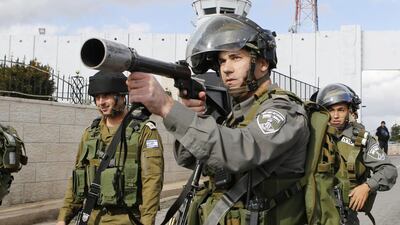This is the time of year when Christians think about Bethlehem, where according to the nativity story Jesus was born in a stable.
So touching is the story that it is recounted in schools even in countries where Christianity is more of a cultural memory than a religion. Bethlehem is described as sited on a hill, bathed in starlight and accessible only by camel (for the three kings), or donkey (for Mary) or, for the shepherds, on foot.
An angel passing overhead today would get a rather different idea. Bethlehem is no longer a place apart. Its residents like to call it a city, and it forms the southern end of the greater Jerusalem conurbation, stretching north through to Ramallah, the temporary Palestinian capital.
Of course, the angel’s eye impression of one big city is wrong. The conurbation is divided by Israel’s snaking security barrier, which here is an 8m-high wall with watchtowers.
Bethlehem is caught between its past and its present. Bethlehemites say their little town brought peace to the world, but now its Palestinian community is struggling against encroaching Jewish settlements.
While Christian congregations revel in the past, local people are more focused on a threat from a new section of the wall that will slice off 300 hectares of the Cremisan valley, placing two monasteries behind the barrier. The Israeli High Court is due to rule soon on an appeal against the proposed route of the wall but given that “security” trumps every other concern in Israel, hopes are not high of a reprieve.
Bethlehem’s mayor, Vera Baboun, says this is the last open space in a town affected by the both the spread of Jewish settlements and Israeli-enforced planning laws that restrict its growth. “If the wall is constructed,” she said, “it will suffocate Bethlehem economically, not just today but for years to come.”
Leila Sansour, an activist whose documentary, Open Bethlehem, has been shown in Britain and will be released in the US next year, is more outspoken: “The existence of the wall means the city has no future.”
As the daughter of a Palestinian who returned home to help set up Bethlehem University, she spent eight years making a film intertwining her life with the town’s struggles during the years of the so-called Palestinian-Israeli peace process.
Bethlehem, she says, must be allowed to thrive because it allows outsiders to understand the Palestinian situation.
“We want to make sure people have a way to engage with the city as a perfect example of what Palestine is like,” she said. “A very diverse city, where Muslims and Christians live harmoniously.”
Every Palestinian town in the West Bank has the same problems, she says, but the occupation is obvious in Bethlehem because of the concrete wall amid a Unesco world heritage site.
Israel is aware that Bethlehem’s religious history means it poses a risk to their reputation that does not exist in Qalqiliya, another town choked by the separation barrier but which has no name recognition abroad.
Buses from Israel take tourists and pilgrims to Bethlehem for brief visits. These trips boost tourism figures without contributing much to the local economy. Tourism slumped after the Gaza war.
Israel media monitors pounce on journalists who liken the separation barrier to the Berlin Wall. This is strictly correct – it does not encircle the town – but the invisible walls of Israeli- enforced planning laws and settler-only roads are just as stifling as any concrete barrier.
The Israelis insist the barrier is a temporary security structure but the International Court of Justice took a different view, ruling in 2004 that the barrier breaches international law. The wall and its associated security regime creates “a fait accompli on the ground which could well become permanent, in which case ... it will be tantamount to de facto annexation”.
Bethlehem now faces a daily struggle for survival. Ever since the refugee influx caused by Israel’s creation in 1948, Bethlehem’s Christians have been in the minority but this is in keeping with the exile of hundreds of thousands of Christians in the region in the past decade. Half of Iraq’s Christians have fled, and the same could happen in Syria if the civil war continues.
Christians have been leaving Bethlehem since Ottoman times, to achieve wealth and an easier life in the Americas. No Palestinian Christian is unaware that if this continues, their future will be as custodians of a religious museum rather than a thriving community.
But that cannot be allowed to happen – Christians are an integral part of Palestinian nationalism and hopes of independence.
Their existence gives the lie to pro-Israeli propagandists who claim Palestinian nationalists are no different from the jihadist cutthroats of ISIL. This is Bethlehem’s iconic importance.
But educated people in Bethlehem will not resist the temptation of exile if they have no freedom of movement and no room to breathe. Perhaps that is what the Israelis seek: a Palestinian population deprived of some of its most vocal advocates.
Bethlehemites need an Israeli pass to go to Jerusalem. Reaching the cities in the northern West Bank, like Ramallah and Nablus, is restricted to one winding road through the Wadi Nar – the Valley of Fire – which can be closed at a moment’s notice by the Israelis.
The people of Bethlehem need to be part of the big city, but the Israelis are restricting it to a small town. If this continues, it will end up as a museum.
Alan Philps is a commentator on global affairs.
On Twitter: @aphilps

